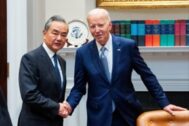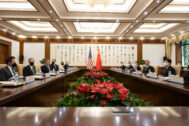Authors
Sourabh Gupta

Sourabh Gupta is a senior Indo-Pacific international relations policy specialist with two decades of Washington, D.C.-based experience in a think tank and political risk research and advisory capacity. His key area of expertise pertains to the intersection of international law, both international maritime law (Law of the Sea) and international trade and investment law, with the international relations of the Indo-Pacific region. His areas of expertise include: analysis of U.S.-China relations as well as major power relations in the Indo-Pacific region, U.S.-China trade and technology competition, analysis of developments in World Trade Organization and Asia-Pacific economic regionalism, and analysis of outstanding territorial disputes and maritime law-related developments in the Indo-Pacific. At ICAS, he heads its Trade n’ Technology Program. Prior to joining ICAS, from 2000 to 2015, he was a senior research associate at Samuels International Associates, Inc, an international consulting firm specializing in government relations and global trade and investment matters. Gupta has appeared on or been quoted in international media, including the BBC, CBS, NPR, CNBC, CGTN and the South China Morning Post, among others. He holds master’s degrees in security studies and international relations from the Walsh School of Foreign Service, Georgetown University, and the Maxwell School of Citizenship and Public Affairs, Syracuse University, respectively. His bachelor’s degree was awarded by the University of Mumbai.
Articles by Sourabh Gupta

US - China
September — December 2023Biden-Xi Woodside Summit and the Slow Rehabilitation of US-PRC Ties
The “guardrails” that President Biden and President Xi envisaged in Bali in November 2022 began to be emplaced at their November 2023 summit in Woodside, California. In-person, leader-led communication was deepened, reassurances exchanged, and practical—albeit modest—“deliverables” locked down on several fronts, including restarting mil-mil communications, cracking down on fentanyl precursors, addressing the national security harms of artificial intelligence (AI), and increased people-to-people exchanges. The establishment of numerous bilateral working groups will ensure an almost full plate of across-the-board consultations in 2024 as well as the means to troubleshoot irritants on short notice. As stabilizing as the Woodside summit was, it failed to deflect the US-PRC relationship from its larger overall trajectory of “selective decoupling” across a range of advanced technologies and frontier industries (microelectronics; quantum; AI; biomanufacturing; clean energy). Strategic trade controls and other competitive actions were doubled down upon. With a pivotal US presidential election looming in 2024, questions abound on the longer-term durability of a rehabilitating US-PRC relationship.

US - China
May — August 2023US-China Effort to Set “Guardrails” Back on Track for Now
The placement of the proposed “guardrails” that Joe Biden and Xi Jinping sought to erect last fall in Bali finally commenced in earnest with the visits to Beijing by three Cabinet secretaries and one National Security Council principals-level appointee. Important steps were taken to put the balloon incident behind them, with lines of communication re-opened, assurances exchanged, and incremental forward progress recorded even in areas such as export controls, where US and China had previously clashed. Defense exchanges remain an area where progress lags. Whether the “guardrails” can survive their first contact with US election year polemics remains to be seen. As ties stabilized, both sides also engaged in sanctions and countermeasures as well as domestic rulemaking to secure their national economic and security interests. All along, the administration continued building “situations of strength” with its allies and partners to shape the strategic environment around China, which Beijing viewed as an act of encirclement.

US - China
January — April 2023US-China Effort to Set “Guardrails” Fizzles with Balloon Incident
The proposed “guardrail” that Joe Biden and Xi Jinping sought to erect last fall in Bali failed to emerge in the bitter aftermath of a wayward Chinese surveillance balloon that overflew the United States and violated its sovereignty. Though Antony Blinken and Wang Yi met on the sidelines of the Munich Security Conference afterward, aspersions cast by each side against the other, including a series of disparaging Chinese government reports, fed the chill in ties. Taiwan President Tsai Ing-wen’s meeting with House Speaker Kevin McCarthy during the return leg of her US transit added to bilateral and cross-strait tensions and were met with Chinese sanctions. Issues pertaining to Taiwan, be it arms sales or a speculated Chinese invasion date of the island, remained contentious. The administration’s attempt to restart constructive economic reengagement with China, including via an important speech by US Treasury Secretary Janet Yellen, appears to have fallen on deaf ears in Beijing.